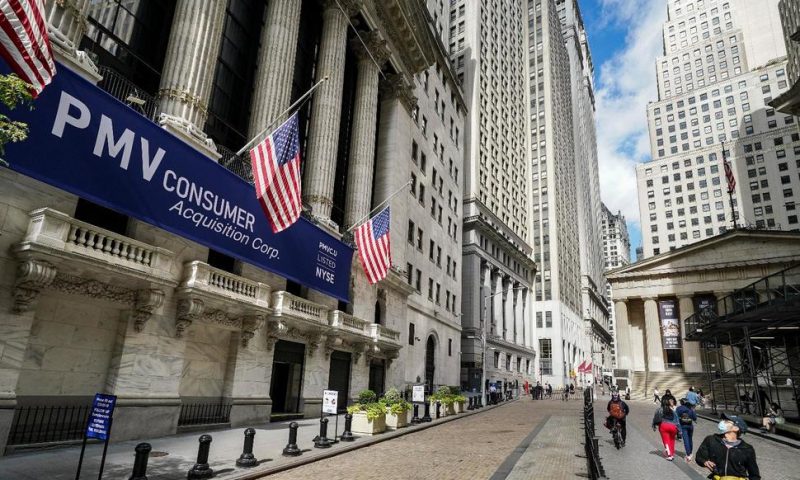Stocks shook off a wobbly start and ended higher on Wall Street.
U.S. stocks overcame a wobbly start to finish higher Thursday, as traders welcomed more corporate quarterly results for the summer that weren’t as bad as Wall Street feared.
The S&P 500 rose 0.5% after shifting between small gains and losses throughout the morning. The index recouped all of its losses from a day earlier, but remains on track for its first weekly loss after notching a gain in each of the previous three weeks.
Health care companies, banks, and communication services stocks accounted for most of the gains. Energy stocks also rose as the price of U.S. crude oil pushed 1.6% higher. Those gains outweighed losses by technology companies and elsewhere in the market. Treasury yields rose, a sign that investors are feeling better about the economy.
After a downbeat start, stocks wobbled for a bit as traders weighed encouraging economic new data on weekly U.S. unemployment aid claims and September home sales. The indexes flipped into the green by midafternoon after House Speaker Nancy Pelosi said that negotiations for another round of economic stimulus were progressing.
The day’s gyrations echo the market’s meandering trading in recent weeks as investors gauge the chances of Washington reaching a deal on more support for the economy. Time is running out to get something done before the election, which has dimmed some of the optimism that Democrats and Republicans will soon strike a bargain on an aid package.
“I have very low expectations for a stimulus deal, but the economic news and corporate earnings news is pretty good, and that’s encouraging,” said Phil Orlando, chief equity strategist at Federated Hermes.
The S&P 500 rose 17.93 points to 3,453.49. The Dow Jones Industrial Average gained 152.84 points, or 0.5%, to 28,363.66. The Nasdaq composite added 21.31 points, or 0.2%, to 11,506.01.
Smaller company stocks fared better than the rest of the market. The Russell 2000 small-cap index climbed 26.48 points, or 1.7%, to 1,630.25.
Investors have been hoping Washington will provide more aid for the economy, which continues to struggle due to the pandemic. The last round of beefed-up aid for unemployed Americans expired at the end of July. Any compromise will likely face stiff resistance from Republicans in the Senate.
Pelosi and Treasury Secretary Steven Mnuchin have been negotiating daily this week on a possible aid package. On Thursday, Pelosi said that progress is still being made.
“Help is on the way. It will be bigger, it will be better, it will be safer and it will be retroactive,” she said.
A piece of such a deal could include extra benefits for workers who lost their jobs due to the coronavirus pandemic. A report on Thursday morning showed that 787,000 workers applied for unemployment benefits last week.
While that’s still an incredibly high number relative to history, it’s down from 842,000 the prior week. It also was not nearly as bad as economists were expecting.
The number of workers continuing to get jobless benefits is likewise easing from its pandemic-era peak. That’s a sign that some people have been able to find new jobs, but it also shows that others are simply using up the last of their state unemployment benefits.
The economy continues to show signs of overall improvement, said Jeff Buchbinder, equity strategist at LPL Financial, including solid gains in retail sales in September. That has dampened some of the immediate need for more stimulus, but high unemployment is still a problem.
“There’s a ways to go, but the outperformance of the U.S. economy over the last several months clearly reduced the need for stimulus,” he said. “There’s widespread agreement that more stimulus is needed, but it may be more targeted.”
Another report showed that sales of previously occupied homes accelerated even more last month than economists expected. Low mortgage rates are driving the action, as is a surge in interest in homes in Lake Tahoe and other resort areas as people look to work from home in more attractive locales, according to the National Association of Realtors.
Big companies, meanwhile, continue to report profits for the summer that took a hit from the coronavirus-caused recession. But they’re mostly not as bad as feared.
Align Technology, which makes Invisalign teeth straighteners, surged 35% for the biggest gain in the S&P 500 after its earnings report blew past Wall Street’s expectations. Stronger sales to teenagers helped the company more than triple analysts’ expectations for earnings per share.
The stock’s surge helped drive health care to the biggest gain among the 11 sectors that make up the S&P 500.
AT&T strengthened by 5.8% after it reported revenue for the latest quarter that beat analysts’ expectations. Coca-Cola gained 1.4%, and Tesla rose 0.7% after both reported earnings that topped Wall Street’s forecasts.
On the losing end were several Big Tech companies. Amazon fell 0.3% and Apple dropped 1%.
Those declines are slight, particularly when compared with the gargantuan gains the stocks made earlier this year. Big Tech companies have grown so massive in size that their stock movements have outsized sway on the S&P 500 and other indexes that are based on the market value of companies.
Overall, earnings have so far been stronger than expected, Buchbinder said, which is a good sign for the economy moving forward.
“The most important thing for the market is to know that the economic recovery is continuing,” he said. “Investors are hoping to hear from companies that economic conditions are improving.”
The yield on the 10-year Treasury rose to 0.86% from 0.83% late Wednesday. It’s still close to its highest level since June.
European markets ended mostly lower, and Asian markets were mixed.

